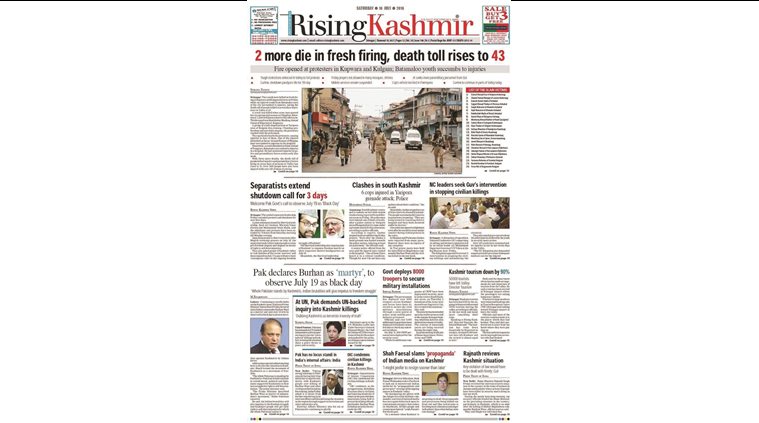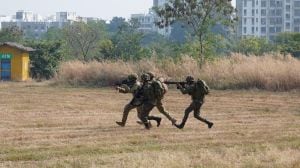WITH newspapers not being published in the Valley for the second straight day on Sunday, following a three-day curb imposed by the J&K government, residents are facing a total blackout on news from within their own backyard.
And they warn that this latest move by the state, coming after Internet and mobile services were restricted, may prove “counterproductive” as it is fuelling anger and generating a sense of “restlessness”.

“It’s painful when you know what is happening in France or Turkey but don’t know anything about your friend or a relative staying 500 metres away,” said Nisar Iqbal, a resident of Sopore, who teaches Computer Sciences at Government College, Baramulla.
[related-post]
Watch Video: What’s making news
Story continues below this ad
“We are connected internationally but disconnected locally. My friend was getting married. And even though we live in the same locality, I couldn’t even wish him,” said Iqbal.
Following the protests over militant Burhan Wani’s killing on July 8, the government on Friday night raided newspaper printing presses, seized hundreds of copies and “conveyed” to owners its decision to impose the curb till July 19.
“We seldom watch TV news because we feel it is more of a drama. All these days, our sources of information were the newspapers,” said Sheikh Younis, a businessman from Barbarshah in Srinagar. “But now, there is a strange feeling of restlessness. It’s as if something is happening somewhere and the government wants to hide it from you. This is proving counterproductive.”
Peer G N Suhail, director of Centre for Research and Policy Development (CRDP) in Srinagar, endorsed that view. “The curbs have created uncertainty because we consider newspapers as an authentic source of information. In their absence, news from social media gains currency and that is where the problem lies,” said Suhail.
Story continues below this ad
Also Read | Editors Guild slams ‘muzzling of media’ in Kashmir
Narrating an incident from Saturday to illustrate how the blockade is affecting the common man, Suhail said: “Yesterday, one of my family members had to come from Baramulla and I was expecting him to arrive by 6 am. But when he didn’t reach by 7 am, I took a taxi to Baramulla only to be informed that he had already reached Srinagar. In normal circumstances, the problem could have been solved by a text message to his mobile phone.”
For Irshada Ayoub, a student of Government Women’s College in Srinagar, the Valley is like “a deserted island”.
“These days, we are living in a world where we don’t know if our relatives are alive or not. The state has been disconnected from the rest of the world. It feels like being on a deserted island. We don’t know what’s happening in our own Valley and that is painful when you are in a situation where you only hear about deaths and injuries. We want to know how our dear ones are doing,” she said.
Story continues below this ad
“This is something which I have never seen before. Such a severe crackdown on communication is quite unimaginable in this day and age,” said Mir Jalal, a Kashmir University student.
“What makes it more shocking is that this is a country that claims to be the pioneer in freedom of speech and digital media. First, they curbed the Internet, then phones and cable TV, and now newspapers. The severity of this clampdown has made us more furious,” said Jalal.

 Editor Shujaat Bukhari tweeted this photo of Rising Kashmir, July 16 edition, ‘seized by police after raiding press’.
Editor Shujaat Bukhari tweeted this photo of Rising Kashmir, July 16 edition, ‘seized by police after raiding press’.






